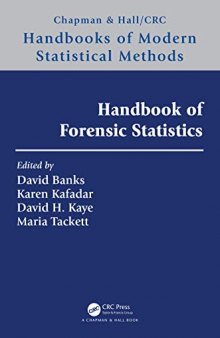 جزییات کتاب
جزییات کتاب
Handbook of Forensic Statistics is a collection of chapters by leading authorities in forensic statistics. Written for statisticians, scientists, and legal professionals having a broad range of statistical expertise, it summarizes and compares basic methods of statistical inference (frequentist, likelihoodist, and Bayesian) for trace and other evidence that links individuals to crimes, the modern history and key controversies in the field, and the psychological and legal aspects of such scientific evidence.Specific topics include uncertainty in measurements and conclusions; statistically valid statements of weight of evidence or source conclusions; admissibility and presentation of statistical findings; and the state of the art of methods (including problems and pitfalls) for collecting, analyzing, and interpreting data in such areas as forensic biology, chemistry, and pattern and impression evidence. The particular types of evidence that are discussed include DNA, latent fingerprints, firearms and toolmarks, glass, handwriting, shoeprints, and voice exemplars.



 دانلود کتاب
دانلود کتاب

 جزییات کتاب
جزییات کتاب





 این کتاب رو مطالعه کردید؟ نظر شما چیست؟
این کتاب رو مطالعه کردید؟ نظر شما چیست؟
